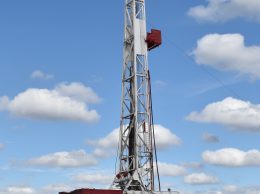Op/ed: Don’t fall for the scary headlines about falling oil prices
By Bill Watkins
In the days after Hurricane Katrina destroyed large parts of New Orleans in 2005, economists were heaping egg on their faces.
Even before the floodwaters had receded, news shows across America featured guest economists with serious and sad faces telling us that this was a major economic event, one that was sure to send us reeling into recession.
Today, nobody remembers the 2005 recession. There wasn’t one. What happened?
Economists were responding to the scale of destruction. No one denies that there was huge damage to buildings and infrastructure, and there were terrible personal costs. Lots of people suffered. But those costs and the suffering need to be put in context. That is, how big was the loss to the U.S.?
You start to answer that question by acknowledging that the U.S. economy is amazingly large, so large that we have difficulty really getting our brains around it.
My colleagues and I wondered just how big the New Orleans economy was — so, we checked. We were surprised to find that New Orleans’ economy was about the size of our own Ventura County.
This is something we could get our heads around. One thing we knew, as much as we love Ventura County, most of the rest of the world would not notice if it slipped into the sea. Certainly, it wouldn’t have much impact on the U.S. economy — it wouldn’t cause a recession.
The ongoing drop in oil prices has provided another opportunity for economists to embarrass ourselves. Some are eagerly embracing that opportunity.
We hear all sorts of silly things: “Falling oil prices were good in the short run but bad in the long run,” “We won’t develop our oil and gas resources,” “Declining investment will cause a recession.”
We need to put the oil price decline in perspective. How big is oil in the U.S.?
According to a report by the American Petroleum Institute, or API, an outfit not likely to underestimate the impact, oil contributed $1.2 trillion to GDP in 2011. U.S. GDP was about $15.5 trillion in the same year. That means oil was about 7.7 percent of GDP. This is down a bit from the 8 percent claimed in the report, most likely because of revisions to GDP estimates.
Oil is a big part of the economy, but the 7.7 percent number includes production, refining, and the like. Oil companies will keep producing. America is using about 19 million barrels of oil a day, and usage is not going to go down because of a price decrease. We’ll still need the oil being produced here, and the oil companies will still produce the stuff.
The other 92.3 percent of the economy will benefit from falling oil prices. What might fall, and what lots of people are worrying about falling, is oil company investments. So, we’d like to know how big oil company investments are, and how those investments might change with falling prices.
The API report tells us about oil industry investments. In 2011, oil industry investments contributed $135.8 billion to GDP. That’s a lot smaller than total impact, but at almost one percent of that year’s GDP, it’s significant. If it were to disappear completely, it would just about offset our estimated one percent increase in GDP benefit of lower oil prices.
Of course, it won’t all disappear.
Oil companies, and probably most companies, can’t just stop investing. New technologies might make old, obsolete equipment, and cost pressures will force adoption of the new technology. New equipment might be needed to maximize profits on existing equipment. A field that is currently shipping oil by truck or train might be more profitable with a pipeline. Companies might invest for the long term, regardless of short-term price fluctuations. New technology might make previously unprofitable plays profitable.
Today’s price declines are a result of increased supply, not a fall in demand as was the case when oil prices fell sharply during the 2009 financial crisis. New technology has allowed us to discover vast new resources while simultaneously reducing the cost to exploit those resources. Financial markets have also changed. We are currently awash in liquidity, and interest rates are extraordinarily low.
Asking oil companies how they will respond to the oil price cuts is an approach that is fraught with danger. Our long and growing history of corporate welfare provides them with huge incentives to overstate the impact of falling prices. Given the incentives, I would consider large oil company’s claims of cutting investment by 20 percent as a worst case scenario.
Independent oil companies are another story. The Independent Petroleum Association of America claims that independents drill 95 percent of oil and gas wells. These guys will be hit hard, but economically, the impact will be small. It’s that context thing again.
The U.S. Energy Information Administration’s most recent estimate of the cost of a completed well is $4 million and climbing. In 2010, according to the EIA, there were 15,084 wells drilled. IPAA data imply that it is reasonable to assume about 14 percent of wells are dry. Do the math. In the unlikely event that drilling were to fall to zero, investment would fall by $64.5 billion. This represents about a 50 percent cut in oil investment, only about 0.4 percent of our $15.5 trillion economy.
No matter how you look at it, it’s hard to see how falling oil prices could hurt the economy by more than about one half of one percent of GDP. By contrast, the positive impacts will likely be at least one full percent of GDP. Until oil production is a larger part of our economy, falling prices are good for most of us, and good for economic growth.
• Bill Watkins is an associate professor of economics at California Lutheran University, where he also directs the Center for Economic Research and Forecasting. Reach him at [email protected].










